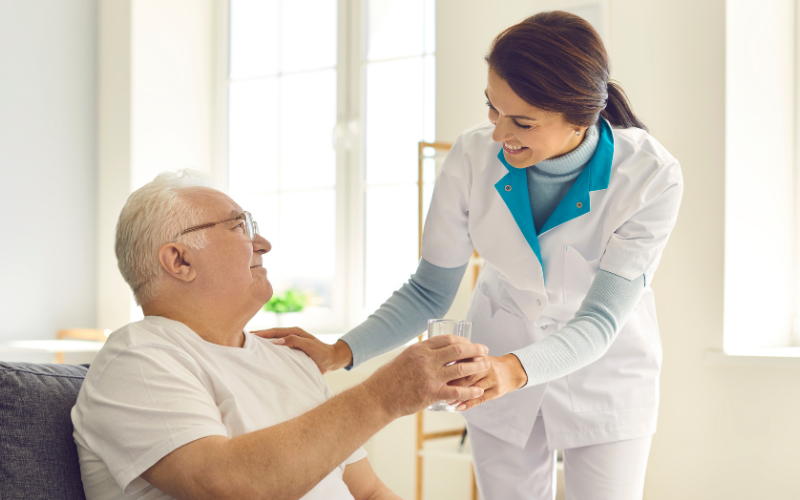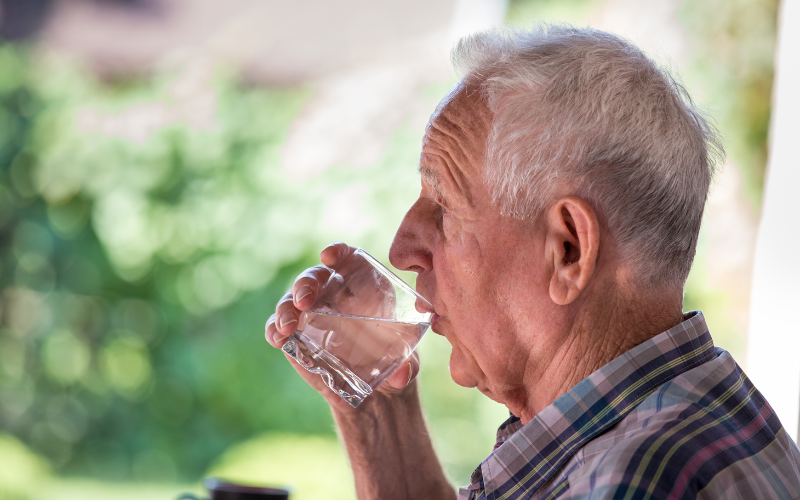The human body consists of 60 percent water, making adequate hydration essential for maintaining bodily functions. However, seniors often do not consume enough fluids, which can lead to dangerous dehydration. Family members and caregivers can play a critical role in preventing this condition among the elderly.
Older adults are at high risk for dehydration; in fact, it is one of the most common reasons for hospitalizations in those over 65. A study by the National Center for Biotechnology Information for the National Library of Medicine reveals that 17-28 percent of aging individuals experience chronic underhydration.
Hydration is crucial for the elderly due to its significant health benefits. Dehydration in seniors can lead to complications such as loss of balance, constipation, kidney problems, and electrolyte imbalances. Severe dehydration is life-threatening, as it impedes the body’s ability to transport blood to vital organs.
Seniors are at a higher risk of dehydration because of the natural aging process. They often experience a diminished thirst response, making them less aware of their need to drink fluids. Additionally, aging reduces kidney function, resulting in increased water loss through urination. Older adults also have fewer water reserves, meaning their bodies contain less fluid. Adequate water reserves are essential for daily bodily functions. Furthermore, seniors may have health conditions or take medications that increase water loss through urination.
Older adults with mild dementia may forget to drink water regularly, as their sensitivity to thirst diminishes. Those with moderate dementia might forget how to drink or where cups are stored. In advanced dementia, patients often cannot express their thirst to caregivers or even recognize that thy are thirsty.
Ensuring adequate hydration in seniors is vital for overall health. Seniors who consume the recommended amount of water each day can better maintain blood pressure, eliminate waste, aid digestion, and regulate body temperature through sweating.
1. Smart Bottles Help Reach Hydration Goals
Caregivers can utilize a number of techniques to ensure their elderly loved ones drink enough fluids each day. Recent innovations include the smart cup, or alternately known as a smart bottle. The smart bottle is designed to promote healthy hydration in users.
The smart bottle (or cup) measures and records the user’s daily consumption of water. The bottle vibrates when it is time to drink more fluids. Tech-savvy seniors can utilize the companion app to track progress toward hydration goals. Others may view the bottle’s LED lights to see their achievements.
2. Hydration Apps Monitor Fluid Intake
Just as countless variations of smart bottles are available, so too are the number and variety of hydration apps. Via this recent technology, seniors receive regular reminders to drink fluids. Apps allow users to set the target intake or use a built-in calculator to determine appropriate goals.
Intuitive apps utilize the senior’s body weight to calculate the right daily intake of fluids. Progress may be readily viewed on the apps, which further encourages seniors to stay hydrated. Activity levels are also incorporated into the apps. The app then correctly calculates the recommended amount of hydration.
While some apps may be purchased for a nominal price, many are free with in-app purchases. Hydration apps are an excellent way for seniors and their caregivers to keep track of individual progress over a seven-day period or up to a 30-day period.
3. Caregivers Monitor for Signs of Dehydration
Seniors who are unable to manage a hydration app may rely on their caregivers to ensure that a healthy amount of liquids are consumed each day. Professional caregivers who are experienced in caring for the elderly will be the first to notice when signs of dehydration are present.
Several behavioral changes are likely to occur when a senior does not consume enough liquids. In seniors with dementia, the patient may experience worsened confusion; or a change in typical behavior will point to the possibility that dehydration has set in.
A caregiver will also respond appropriately if the senior exhibits other signs of dehydration, such as fatigue, weakness, dizziness, nausea, and muscle cramping. Upon providing bathroom assistance, the caregiver may notice darker colored urine as a sign of dehydration in the senior.
Professional caregivers provide the elderly with hydration options. A senior who resists drinking plain water throughout the day may find juice, tea, or flavored water to be a more agreeable alternative. Caregivers implement creative tactics to help dementia patients drink enough liquids.
Liquids may be consumed via sweet treats, like popsicles, hot chocolate, Jell-O, ice cream, and applesauce. Caregivers may prepare broth-based soups to ensure the care recipient consumes liquids. Serving fruits and vegetables is a healthy way to incorporate liquids into the senior’s daily diet.
The following are additional tips for family members and caregivers to help ensure seniors with dementia are drinking enough to stay hydrated:
- Encourage the senior to drink water throughout the day, they should be drinking 8 to 10 glasses of water per day, or one and a half to two liters of water each day.
- Make sure to have a drink nearby when the senior is eating.
- You can use brightly colored cups to get their attention or clear glasses so they can see what is inside the glass.
- Offer the senior a drink or leave a glass of water where they can see it.
- Offer the senior a variety of drinks in addition to water, including tea, coffee, juice, smoothies, and more.
- Use a cup or glass that is suitable for them, such as one that is easy to hold and use and if necessary, not breakable.
- Serve foods with high liquid content like soup, yogurt, and popsicles.
- It is usually best for those with dementia to avoid consuming alcohol. When drinking alcohol, limit the senior to 1-2 drinks and keep the alcohol hidden so they cannot serve themselves.
Preventing Dehydration with Dementia Care from Assisting Hands

Preventing dehydration in the elderly, particularly those with dementia, can be effectively managed through a thoughtful combination of smart cups/bottles, hydration apps, and professional home care from Assisting Hands Home Care. We offer a wide range of compassionate non-medical services.
Our dementia caregivers are skilled in recognizing the symptoms of Alzheimer’s disease and other forms of dementia. For example, if patients with dementia begin to wander, our caregivers gently guide them back to the safety of their home environment.
Our caregivers treat incontinence issues in the elderly with utmost discretion. We assist seniors with bathroom use, dressing, bathing, and grooming. If dementia-related frustration arises, our caregivers respond with compassion and expertise to help restore a calm state of mind.
Alongside our comprehensive Alzheimer’s and dementia care services, we offer in-home support for all activities of daily living (ADLs). Our caregivers prepare nutritious meals, provide timely medication reminders, perform light housekeeping, and offer transportation for medical appointments and errands.
Families with seniors living in the surrounding communities of Deerfield, Buffalo Grove, Highland Park, Lake Forest, Lake Zurich, Lincolnshire, Mundelein, Vernon Hills, IL are encouraged to consult Assisting Hands Home Care for dedicated elder care services. Call us at 847) 595-1222 for an initial assessment, and we’ll develop a customized care plan to preserve their health and well-being.
















